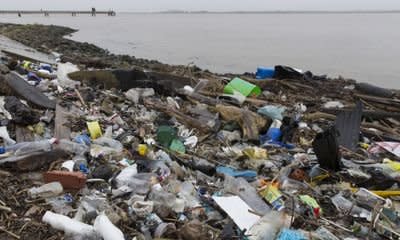Manufacturers to pay recycling costs in bid to stop waste

Manufacturers will pick up the burden of paying for recycling under new government plans which hope to cut down on waste going to landfill.
Currently councils pay 90% of the bill for recycling, but if a new strategy gets the green light this will go to the product manufacturers, forcing them to think about sustainable packaging.
Producers will have to pay the full net cost of disposing or recycling the packaging, with money going to councils to help them improve waste and recycling systems.
The industry will have to pay more if products are harder to reuse or recycle, and the environment department (Defra) hopes this will encourage more sustainable design.
Other proposals in the plans include:
:: Homes to have weekly food waste collections
:: Packaging clearly labelled to show if it can go in household recycling bins
:: Producers to pay full net costs of disposing or recycling packaging
:: Councils to receive funding to help improve waste and recycling systems
It could raise between £500m and £1bn per year to aid recycling and the disposal of rubbish.
The plans also include a commitment for weekly food waste collections in every home, and clearer labelling on packaging to show if it can be recycled.
That runs alongside proposals for a deposit return scheme - announced by Environment Secretary Michael Gove earlier this year - which was a major victory for the Sky Ocean Rescue campaign.
Such schemes usually involve customers paying a small fee on top of the cost of a drink, which is then returned when they bring back the bottle.
Figures on household recycling in England show rates have flat-lined in recent years.
The new proposals will mean more consistent recycling schemes across councils all over the country and should result in a reduction in the amount of recyclable waste that ends up in the wrong bin.
Mr Gove said: "We really need to shift the dial on recycling and our strategy will help make that happen.
"We'll make sure producers pay more in order to use the material that goes to generate all this waste."
In the foreword to the new strategy, he added: "We know there is an urgent need for new thinking to tackle avoidable waste, particularly plastic.
"An estimated eight million tonnes of plastic waste enter the sea each year. Devastating evidence of the damage to wildlife and habitats has been shown in programmes such as Blue Planet II on the BBC and Sky (Frankfurt: 893517 - news) 's Ocean Rescue campaign."
Environment minister Therese Coffey also told Sky News: "It's all about trying to ensure that we have a more sensible way of designing products that can be re-used or recycled much more readily than we have today. That's a big change."
She (Munich: SOQ.MU - news) added the move would make how people's waste is recycled at home more "consistent".
In addition to the plans outlined, Defra has also mooted the potential return of free garden waste collections, which many households have lost in recent years due to council spending cuts.
Environmental campaigners have welcomed the intervention from government, but are concerned by the fact that the plans - to be approved following consultation in the new year - will not enter law until 2023.
Dr Lyndsey Dodds, head of UK marine policy at WWF, said: "It is great that the government is making recycling easier and that they are finally asking producers to pay the cost. But that alone won't cure our plastic plague.
"We must reduce the amount produced and used. We need the government to follow through on this strategy with strong and urgent action to turn the tide on plastic - before it is too late."
Louise Edge, from Greenpeace UK, added: "The really encouraging part of these proposals are the plans to ensure that companies who create and sell plastic packaging will at last pay for dealing with the consequences.
"This should be a big help in getting difficult to recycle and expensive plastic packaging off our supermarket shelves, driving better product design and much needed investment in refillable and reusable packaging.
Martin Tett, environment spokesman for the Local Government Association, warned that existing contracts councils with waste collection companies means some may not be able to implement the changes until later.
:: Sky's Ocean Rescue campaign encourages people to reduce their single-use plastics. You can find out more about the campaign and how to get involved at skyoceanrescue.com

 Yahoo News
Yahoo News 